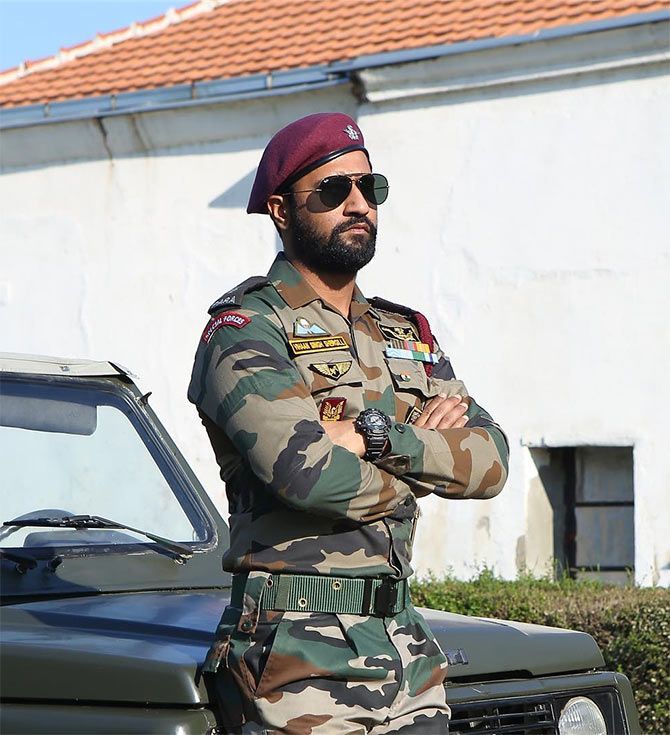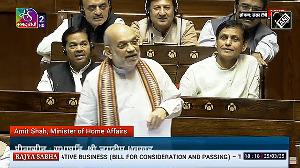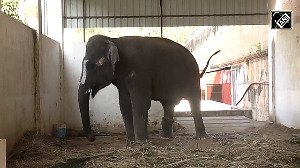Movies, their motives and time of release make me wonder if we'll ever be able to see India as India and not a reflection of its governments, notes Sukanya Verma.

In the final few minutes of Vidhu Vinod Chopra's Parinda, Nana Patekar sneaks in Anil Kapoor and Madhuri Dixit's bedroom and indiscriminately opens fire.
In retaliation, Kapoor's furious older brother Jackie Shroff storms inside Nana's house and burns him alive.
The same 'Ghar Mein Ghus Ke Marega' sentiment of retribution drives Uri-The Surgical Strike, except the backdrop is military not mafia.
Director Aditya Dhar focuses on the events of September 2016 wherein 19 jawans lost their lives in a brazen terror attack on the Indian military town of Uri in Jammu and Kashmir, prompting the Indian government to conduct a surgical strike on terrorist launchpads in Pakistan occupied Kashmir.
To make its tactical premise more personal (read filmi), Dhar weaves the operation around an undaunted, indestructible para commando Vihaan Singh Shergill (Vicky Kaushal).
Right at the onset, his gallantry is on full display, as he and his troops annihilate a large group of north east insurgents in a visually arresting ambush.
The golden light of blazing explosives plays off against the midnight blues and shadowy greens of army fatigues even as an atmosphere of urgency, unpredictability and disorder challenges their acute presence of mind.
What the kinetic set piece really establishes is that Shergill is an asset to the Indian armed forces whose request for premature retirement to tend to his Alzheimer-stricken mother (Swaroop Sampat) is denied with a desk job.
Serve the country he must under all circumstances, because as the prime minister sagaciously explains, "Woh bhi maa hai."
Shergill makes peace with his new job profile but the look of longing, as he watches his band of brothers (Mohit Raina pitching in as the dashing, daredevil brother-in-law) hit the field, suggests he's feeling terribly left out. He spots the same disenchantment in Kirti Kulhari's air force pilot.
Kaushal plays the sort of uncommunicative character who won't let us inside his head yet demand we buy into his willful resolves at a moment's notice. And the actor does a mighty good job of lending his pent-up turmoil heft and headstrongness, reserving rare shows of warmth for his mother, sister, niece and comrades.
There's a slowly erupting quality to his manners whether he's accusing the house nurse (Yami Gautam, earnest and underused) of espionage or ordering his unit to cast off their cell phones until the mission is accomplished.
It's a mild indication of the ferocity he's capable of and unhesitatingly unleashes in scenes of torture and execution.
All of which is cut loose after a family member is martyred in the aforementioned terror attack.
At once, Shergill announces his decision to lead the approaching surgical strike guaranteeing the task's sure shot success as well his fellowmen's safety. What ensues though is neither surprising nor stimulating.
If one half of Uri is a prelude to the strike, the other is a tedious game of Call of Duty.
In between the political face of Uri's soft propaganda throws up familiar faces in the form of actors bearing uncanny resemblances to then defence minister Manohar Parrikar, National Security Advisor Ajit Doval (Paresh Rawal) and, of course, PM Narendra Damodardas Modi (Rajit Kapoor's Modi is more contemplative than grandstander) though the jingoism is not as excessive as the trailer brandished.
Rawal, Kapoor and a set of skillful supporting actors contain its tone, but the underlying message remains the same -- offence is the best defence.
To make sense of this aggression, Rawal cites an example of Munich's Operation Wrath of God.
Uri's ideals resonate with that of Parmanu's, both conveying the BJP-led government's audacious, PR policies to reinforce India's individuality over who cares what the US, UN think?
Movies, their motives and time of release make me wonder if we'll ever be able to see India as India and not a reflection of its governments.
Although Uri doesn't go berserk bashing Pakistan like, say a Gadar, the enemy lines are drawn loud and clear, undoing all the good Raazi did.
"Unko Kashmir chahiye, humko unka sarr," screams Shergill to motivate his company.
Across the border, an official sneers, "Actors and singers ban kar diye jayenge" at India's tendency to boycott Pakistani entertainers and artists on such occasions.
Suddenly, Rakesh Bedi shows up in an amusing cameo that belches as actively as it spouts Urdu, not too different from Chashme Buddoor's Omi all grown up yet still so sneaky.
Split into multiple chapters, Dhar's storytelling aspires for the stylish, adrenalin-pumping space of Tony Scott/Michael Bay action movies high on men in uniform, nerd with a breakthrough gadget, bureaucratic power play, swooping choppers, high-scale spectacle and a snazzy background score (Shashwat Sachdev scores a winner).
In fits and starts, Uri achieves it too.
But this deadpan take on warfare is devoid of the elements of tension, personality and depth, making it superficial and soulless.
A good deal of its 138 minutes is spent in planning a covert attack or 'Uri ka badla' across jargon and technicalities that do little to keep the viewer interested.
Nothing in Uri spells beyond a news report.
It's absurd how all of its tribute to army folk boils down to mostly Kaushal's bravado.
The battalion trailing behind him has the significance of action figures.
Barring his brief camaraderie around the BFF cum brother-in-law, Uri portrays Kaushal as some kind of superhero who single-handedly won the war.
Revenge over personal loss is hardly patriotism.
It's just run-of-the-mill revenge.
Despite slick visuals and solid acting, Uri fails to make this distinction.













 © 2025
© 2025